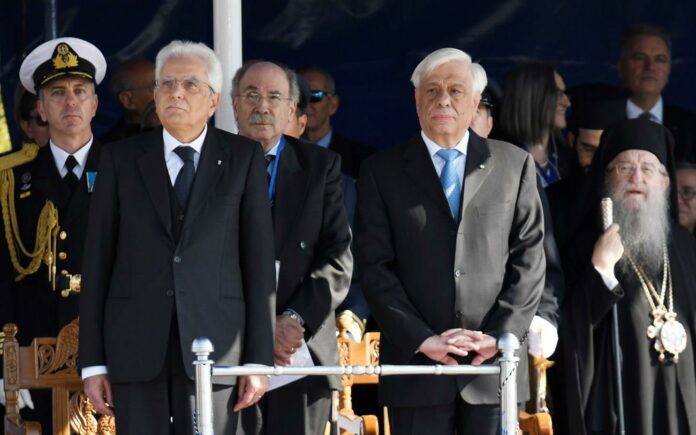A national holiday in Greece on Sunday commemorated the 78th anniversary of the country’s entry into WWII, known as “Oxi Day”, with Italian President Sergio Mattarella joining his Greek counterpart Prokopis Pavlopoulos on the official grandstand for the annual military parade in the northern city of Thessaloniki.
“A new Greece and a new Italy were born from resistance to Nazi-fascism, while then disavowing war. After the terrible wars of the past century, European integration and the European Union mark the beginning of a course for a common future by European countries; guarantors of peace, friendship and cooperation,” Mattarella said during his highly symbolic attendance at the commemoration.
“Greece and Italy leave behind them all that divided us in the past,” Pavlopoulos said after the parade.
Fascist Italy attacked Greece through the frontier of occupied Albania shortly before dawn on Oct. 28, 1940, marking the country’s entry into the Second World War. “Oxi”, Greek for “No”, stems from an unambiguous refusal by Greek Premier Ioannis Metaxas to acquiesce to an ultimatum presented to him by the Italian ambassador in Athens even as Italian forces had mobilized to breach the border.
Both heads of state will travel to the Ionian island of Cephalonia on Monday for a memorial ceremony honoring the roughly 5,000 Italian servicemen executed by German forces in 1943.
In his message for the day, Greek Prime Minister Alexis Tsipras referred to a “historic role” by Greece in the fight against racism, intolerance and chauvinism, so that “the specter of fascism never again is seen in Europe”.
Main opposition New Democracy (ND) leader Kyriakos Mitsotakis, who was in Hania (Chania) prefecture of Crete for the commemoratoin, called for national unity and a rejection of populism and divisiveness, as he said.
“Today we honor the grand ‘No’ that was uttered in the mountains of Macedonia and Epirus 78 years ago. Our generation must, in its own way, say ‘no’ to populism, divisiveness and fanaticism.”














